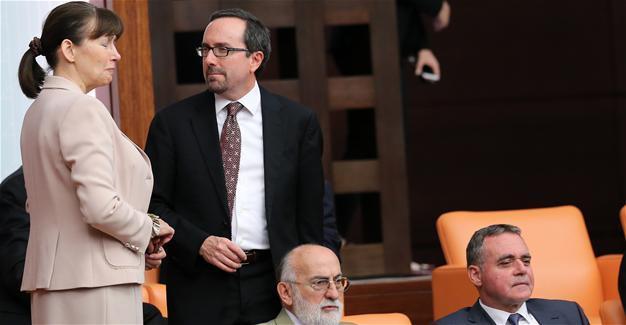US supports Turkish-Israeli energy talks, says US envoy
ISTANBUL - Anadolu Agency

AA photo
The United States strongly supports a proposal to transport Israeli gas to Europe via Turkey with the side aim of ensuring peace and stability in the Middle East, John Bass, the U.S. ambassador to Ankara, told Anadolu Agency on Oct. 13.
“Seeing the Israeli energy minister here today with the Turkish energy minister, talking about collaborative projects that will benefit both economies is an indicator of how energy can help promote peace and stability. We strongly support achieving those objectives,” Bass told Anadolu Agency on the sidelines of the World Energy Congress (WEC).
Israeli Energy Minister Yuval Steinitz met with Turkish counterpart Berat Albayrak at the WEC in the first visit by an Israeli minister to Turkey since the two countries normalized their relations following the 2010 Mavi Marmara incident, in which Israeli commandos killed 10 Turkish activists bringing aid to Gaza.
The ministers’ discussions focused on the possibility of transporting Israeli gas to Europe via Turkey.
Bass said he was in Istanbul for the congress in part because of the importance of energy for all.
“It is a big piece of our strategic partnership with Turkey to cooperate on energy to promote economic development for both countries and to reinforce the importance of ensuring that all of our NATO allies and partners have access to a diverse set of supply and sources. We believe that is an important part of energy security,” Bass said.
“Seeing so many producing countries, consuming countries, companies involved in upstream, downstream and new technologies all present in Istanbul is a reflection of how important Turkey is to all of these issues for the next generation,” said Bass.
Following the Mavi Marmara attack, Turkey demanded the fulfillment of a number of conditions – an apology, the payment of compensation and the lifting of Israel’s Gaza blockade – before the return of normal relations. Ankara now considers these terms to have been fulfilled.
Bass commented on the possible gas pipeline project to carry Israeli gas to Europe via Turkey, cautioning that companies will have to determine the commercial viability of the project and whether there is a market for the gas in Europe.
“That is, in part, a function of supply and demand, it is a function of future economic growth rates in Europe and demand for energy and it is a function of whether other suppliers out there can deliver the product and at what prices. But I think the really important thing is you have got so many people here today talking about the details and the merits of how it might happen,” the U.S. ambassador said.
Turkish and Israeli companies are discussing a possible gas pipeline between Israel and Turkey to transport natural gas supplies to Europe from the Leviathan gas field, which holds an estimated 620 billion cubic meters of gas.
Bass also reiterated the U.S.’s strong commitment to negotiations on Cyprus between all stakeholders to achieve a settlement, with energy also set to play a lead role in the talks.
“First and foremost, it is important that the parties on the island find an arrangement that is in accordance with a bi-zonal, bi-communal federation. We see lots of opportunities and benefits flowing to both communities if they can achieve that goal,” Bass added.
Energy cooperation, its access and the use of the energy resources in the economic area around Cyprus would be a key factor to accomplish that goal, he said.
